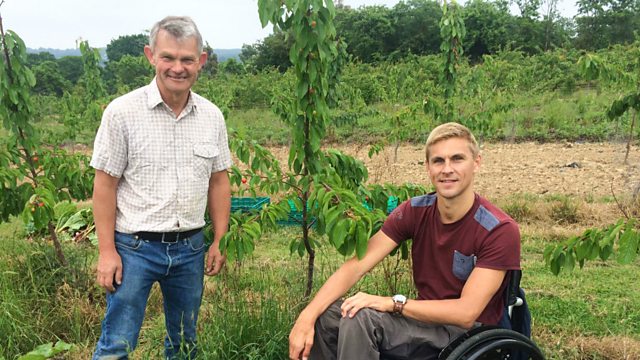
West Sussex
In West Sussex, Matt explores the phenomenon of 'champing' - where people pay to stay in churches - and Ellie meets Maya Leonard, a self-proclaimed insect activist.
Matt, Ellie and Steve are in West Sussex, where Matt explores the phenomenon of 'champing' - where people pay to stay in churches. He also meets the man who listens to trees and discovers the surprising world beneath their bark.
Ellie meets Maya Leonard, a self-proclaimed insect activist, to hear how beetles are just as important at pollinating plants as bees.
Steve is with the volunteers who hope to put an end to food waste. They call themselves gleaners, and today they are helping themselves to a field full of unwanted rhubarb.
Also in this programme, Tom looks at the problem of untreated sewage being dumped in rivers, Adam meets the brewer who he hopes will buy his barley, and Adam and Charlotte announce the winner of Countryfile's Farming Hero Award.
Last on
Champing

River Sewage

Gleaning

Steve discovers how a nationwide group of volunteers, farmers and food redistribution charities are working together to tackle food waste.
Millions of tonnes of perfectly good food is thrown away in the UK every year.
The Gleaning Network was set up to help salvage fresh fruit and vegetables that could otherwise go to waste on UK farms and direct this fresh, nutritious food to local people in need.
Steve spends the day with a team of 'gleaners' down on an East Sussex farm to help them gather in a crop of rhubarb that would otherwise have gone to waste.
Steve finds out how a day spent gleaning may be hard work but it can also be a really great day out!
Lupins

Ellie visits Terwick church field, a National Trust site dedicated exclusively to growing lupins.
National Trust ranger Fiona Scully reveals the touching story behind the floral spectacle: the field was bequeathed to the Trust in the 1930s by the owner on the understanding that it would always be filled with lupins - her husband’s favourite flower.
Ellie discovers how insects love lupins! Local bug expert and children’s author Maya Leonard explains that it’s not just bees and butterflies that pollinate but beetles, moths and flies too - the ‘ugly’ and ‘mucky’ pollinators!
A quick look around this rich habitat shows any gardener the value of these unexpected pollinators to the environment and is a perfect way to round off national insect week.
Farming Hero 2018

Tree-listening

Matt visits the beautiful botanic gardens of Wakehurst to see a very unusual project.
Amongst some old oak trees he meets Alex Metcalf, who uses various electronic equipment - and an ear trumpet - to listen to trees!
It seems implausible, but there’s sound science going on here: the trees are sucking up water through their xylem tubes, all the way from the roots to the leaves, and it’s the movement of water behind the bark that Alex listens to.
Matt discovers an oak tree can drink more than 200 litres a day and, thanks to an experiment devised by Alex featuring a hand pump and a lot of buckets, he appreciates just how hard the tree is working to drink all that water!
As Matt listens to different trees in the woodland, we can hear how each one makes its own distinct sound as it draws water from the ground and up its trunk. The entire forest is alive and flowing!
Credits
| Role | Contributor |
|---|---|
| Presenter | Matt Baker |
| Presenter | Ellie Harrison |
| Presenter | Steve Brown |
| Presenter | Tom Heap |
| Presenter | Adam Henson |
| Presenter | Charlotte Smith |
| Executive Producer | William Lyons |
| Series Producer | Joanna Brame |
Broadcasts
- Sun 24 Jun 2018 19:00
- Sun 1 Jul 2018 08:10
- Tue 3 Jul 2018 00:45
